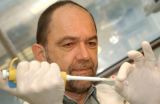(Press-News.org) Plaque-causing bacteria can jailbreak from the mouth into the bloodstream and increase your risk of heart attack says a scientist at the Society for General Microbiology's autumn meeting in Nottingham.
Professor Howard Jenkinson, from the University of Bristol explains how oral bacteria can wreak havoc if they are not kept in check by regular brushing and flossing. "Poor dental hygiene can lead to bleeding gums, providing bacteria with an escape route into the bloodstream, where they can initiate blood clots leading to heart disease," he said.
Streptococcus bacteria commonly live in the mouth, confined within communities termed biofilms and are responsible for causing tooth plaque and gum disease. The University of Bristol researchers, in collaboration with scientists at the Royal College of Surgeons in Ireland (RCSI), have shown that once let loose in the bloodstream, Streptococcus bacteria can use a protein on their surface, called PadA, as a weapon to force platelets in the blood to bind together and form clots.
Inducing blood clots is a selfish trick used by bacteria, as Professor Jenkinson points out. "When the platelets clump together they completely encase the bacteria. This provides a protective cover not only from the immune system, but also from antibiotics that might be used to treat infection," he said. "Unfortunately, as well as helping out the bacteria, platelet clumping can cause small blood clots, growths on the heart valves (endocarditis), or inflammation of blood vessels that can block the blood supply to the heart and brain."
Professor Jenkinson said the research highlights a very important public health message. "People need to be aware that as well keeping a check on their diet, blood pressure, cholesterol and fitness levels, they also need to maintain good dental hygiene to minimise their risk of heart problems."
The team is using a brand-new blood flow model, developed by Dr Steve Kerrigan at the RCSI, School of Pharmacy, Dublin, that mimics conditions in the human circulatory system. "We are currently investigating how the platelet-activating function of PadA can be blocked. This could eventually lead to new treatments for cardiovascular disease which is the biggest killer in the developed world," said Professor Jenkinson.
INFORMATION: END
Selfish bacterial cells that act in their own interests and do not cooperate with their infection-causing colleagues can actually reduce the severity of infection.
The selfish behaviour of these uncooperative bacteria could be exploited to treat antibiotic-resistant infections, according to research being presented at the Society for General Microbiology's autumn meeting today.
Bacteria work together by using a well-studied communication system called Quorum Sensing (QS). During infection, bacteria talk to each other using QS to coordinate the release of toxins.
Researchers ...
While we are often exposed to bacteria in our food which could cause food poisoning, we don't always become ill - why should this be so?
Professor Colin Hill who is presenting his work at the Society for General Microbiology's autumn meeting in Nottingham today describes how bacteria use different tricks to aid their survival inside the body, helping to explain why food poisoning can be so unpredictable.
One of the biggest challenges faced by food-borne bacteria is acid. Acidic conditions, particularly in the stomach and in the gut will kill most microbes found in contaminated ...
TORONTO, ON - Widespread reports of a decline in the population of bees and other flower-visiting animals have aroused fear and speculation that pollination is also likely on the decline. A recent University of Toronto study provides the first long-term evidence of a downward trend in pollination, while also pointing to climate change as a possible contributor.
"Bee numbers may have declined at our research site, but we suspect that a climate-driven mismatch between the times when flowers open and when bees emerge from hibernation is a more important factor," says James ...
STOCKHOLM (6 September 2010)—Against a backdrop of extreme weather wreaking havoc around the world, a new report warns that increasingly erratic rainfall related to climate change will pose a major threat to food security and economic growth, especially in Africa and Asia, requiring increased investment in diverse forms of water storage as an effective remedy.
"Millions of farmers in communities dependent on rainfed agriculture are at risk from decreasing and erratic availability of water," said Colin Chartres, director general of the Sri Lanka-based International Water ...
CAMBRIDGE, Mass. -- Plants are good at doing what scientists and engineers have been struggling to do for decades: converting sunlight into stored energy, and doing so reliably day after day, year after year. Now some MIT scientists have succeeded in mimicking a key aspect of that process.
One of the problems with harvesting sunlight is that the sun's rays can be highly destructive to many materials. Sunlight leads to a gradual degradation of many systems developed to harness it. But plants have adopted an interesting strategy to address this issue: They constantly break ...
SANTA CRUZ, CA--A tiny optical device built into a silicon chip has achieved the slowest light propagation on a chip to date, reducing the speed of light by a factor of 1,200 in a study reported in Nature Photonics (published online September 5 and in the November print issue).
The ability to control light pulses on an integrated chip-based platform is a major step toward the realization of all-optical quantum communication networks, with potentially vast improvements in ultra-low-power performance. Holger Schmidt, professor of electrical engineering in the Baskin School ...
One of the key drivers of human evolution and diversity, accounting for changes that occur between different generations of people, is explained by new research published today (Sept 5) by world-renowned scientist Professor Sir Alec Jeffreys, who discovered DNA fingerprinting at the University of Leicester.
Professor Jeffreys has spent over two decades since his landmark discovery in 1984 investigating what he describes as "pretty bizarre bits of DNA" - highly variable repeated parts of DNA called 'minisatellites' - found in the human genome. Sir Alec observed that ...
Biologists at the University of California, San Diego have discovered that a gene critical for programmed cell death is also important in the loss of adult stem cells, a finding that could help to improve the health and well-being of patients undergoing cancer treatment.
"During chemotherapy or radiation therapy that kills cancer cells by inducing significant DNA damage in their genomes, one of the main side effects for human cancer patients is the depletion of their own adult stem cells, particularly the ones responsible for making new blood and intestine cells. So these ...
A new website providing busy mums with a central point to discover businesses that provide home delivery and in-home services was recently launched.
The new website - http://www.mumsdelivery.com.au - is a business directory for mums interested in shopping and arranging in-home services from the comfort of their own home. The website is intuitive and easy to navigate, making it simple for users to find the businesses they are looking for.
Mums today are particularly technologically savvy. The 'online mum' demographic is emerging as one of the fastest growing segments ...
The Bornmann Law Group, PLLC, a debt relief agency servicing all of Arizona, has launched their new informational and advisory blog, http://www.bankruptcy-az.com/wordpress/. This bankruptcy themed blog is written by bankruptcy attorneys and bankruptcy lawyers who advise and help people file for bankruptcy relief under the Bankruptcy Code.
Their blog focuses on bankruptcy planning, Chapter 7 and Chapter 13 filing options, advice on wage garnishments and repossessions, bankruptcy law and advice for those that are experiencing extreme financial difficulty. Recent articles ...


